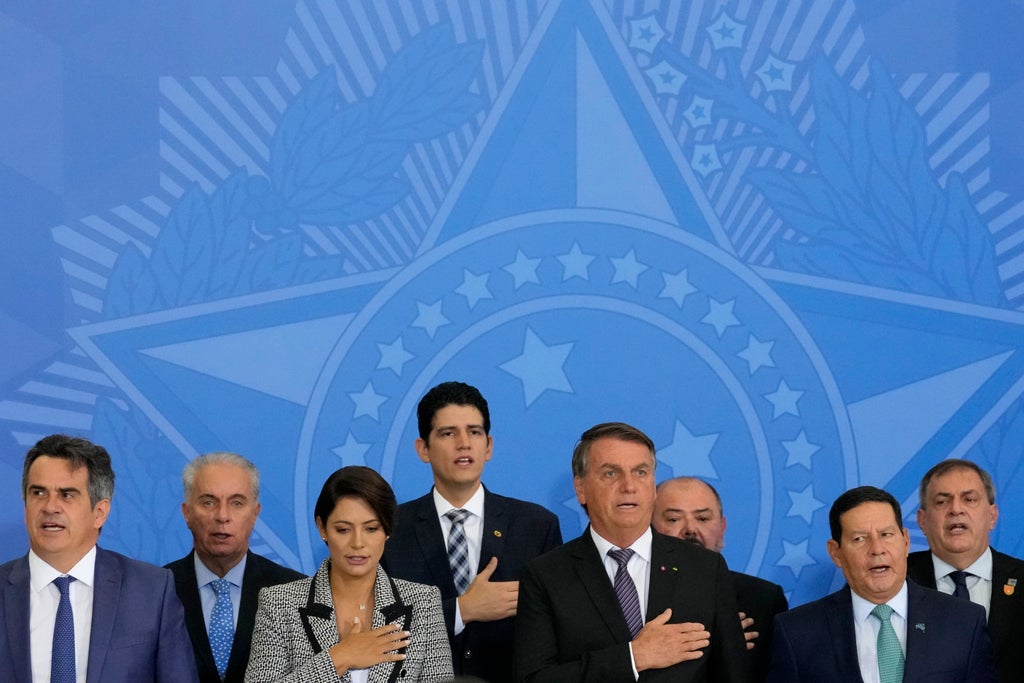
Members of President Jair Bolsonaro's Cabinet have left the administration en masse to help boost the Brazilian leader's reelection chances by supporting him as they campaign for congressional seats and governorships.
Ten ministers left their positions Thursday, along with three other top officials, according to the official gazette. They are expected to campaign for office ahead of October's general elections and stump for Bolsonaro. Top officials must resign in order to run for other positions, per electoral law.
“I'm in my third straight administration, and I never saw a team of ministers so connected to the president, so loyal, so devoted,” outgoing Infrastructure Minister Tarcísio de Freitas said at an event organized for the officials on Thursday.
Outgoing Defense Minister Walter Braga Netto was made a special advisor to the president. He is seen as a top contender to become Bolsonaro's running mate.
The shake-up is an important step toward the hotly anticipated election expected to pit Bolsonaro against his political nemesis, former President Luiz Inácio Lula da Silva, political analysts said. Even though the regional and presidential campaigns don’t officially begin until August, both politicians have already begun holding large events.
Most outgoing officials have joined the same centrist Liberal Party that Bolsonaro joined in November. In the coming months, they will promote their achievements as well as those of the administration in some of Brazil's farthest reaches, according to Carlos Melo, a political science professor at Insper University in Sao Paulo.
“Campaigning in a country this size is difficult; you need people to help with that,” said Melo, noting that Latin American's largest nation has 27 states and more than 5,000 municipalities. “Their effort backs the president’s own reelection effort.”
Polls have consistently shown far-right Bolsonaro trailing well behind leftist da Silva in a head-to-head runoff that is likely to follow the October vote. Pollster Datafolha shows da Silva leading by about 20 percentage points. While that is a smaller margin than in prior months, Bolsonaro will need all the help he can get to close the gap given more than 12 million people are unemployed, inflation is running above 10% and fuel prices are surging.
Until campaigns officially begin in August, Brazil's electoral laws forbid potential candidates from asking for votes directly, but doesn't prohibit events that resemble campaign rallies.
On Saturday, da Silva participated in an event commemorating the 100th anniversary of the Communist Party of Brazil. He told the crowd he believed the electorate will remove Bolsonaro from office in 2022.
For his part, Bolsonaro has made more than 20 trips around the country while launching programs and public works in the first three months of the year, according to his official agenda.
On Sunday, the president addressed thousands of supporters in the capital, Brasilia, which many observers characterized as the unofficial launch of his campaign. The event introduced the slogan “Bolsonaro, the people's captain,” and a video displayed archive images from the president’s life for cheering supporters dressed in the green and yellow colors of the Brazilian flag. Some hopped on stage to take selfies with the president.
Speaking at Thursday's event, Bolsonaro, a former army captain, started by celebrating the legacy of the two-decade military dictatorship on the anniversary of the 1964 coup. Then he lauded his Cabinet for its work since he took office in 2019.
“One third of my ministers leave today with their heads held high,” Bolsonaro said. “It’s obvious that they will run for office. If not, they wouldn’t leave.”
Officials, for their part, delivered a series of speeches lavishing praise on Bolsonaro for his administration's achievements and expressing their gratitude to him.
Onyx Lorenzoni, the outgoing labor minister, praised Bolsonaro's “personal courage” for bucking the global consensus that restrictions should be imposed on activity to prevent COVID-19's spread. A Senate investigation of the administration's chaotic management of the pandemic determined that several officials, including Bolsonaro, should be charged with crimes.
"Example, character, virtue — those are the differences between the man who governs Brazil now from those who governed in the past,” Lorenzoni said. “All of us here, my minister colleagues, are at this moment leaving the government, but they are not leaving the project. They are not leaving the purpose, the purpose to transform Brazil.”
Participating in Bolsonaro's administration gave many officials greater visibility and popularity so they can run for office without depending solely on Bolsonaro, according to Maurício Santoro, a political science professor at the State University of Rio de Janeiro.
They have until August 15 to register their candidacies and, until then, political alliances can shift and poll numbers will help determine who campaigns for which pósition.
Lorenzoni and de Freitas have already said they will run for governorships in Rio Grande do Sul and Sao Paulo states, respectively. The outgoing citizenship minister is expected to run for governor of Bahia state.
The outgoing science and technology minister and culture secretary have said they will run for legislative seats and the government secretary has said she will run for a Senate seat.
An exception is likely to be former Education Minister Milton Ribeiro, who resigned this week amid allegations of possible corruption in his ministry.
If Bolsonaro wins his election, political analyst Melo said, the former ministers who likewise win their races would help build a strong congressional bloc backing the president. If he loses, they would become part of the opposition.
“We don't have a fight of right against left,” Bolsonaro said on Thursday. “We have a fight of good against evil. And the good will win!"







